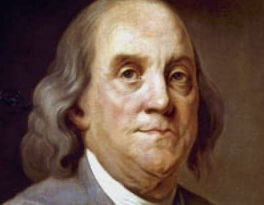Over the years I have had this experience many times. I’m not sure why. I’ll be in the middle of some sort of “modern” experience, like driving on the highway, and I’ll think “I wonder what Benjamin Franklin would think of this.” Benjamin Franklin was considered to be one of the most brilliant men of his time so I expect he would have a great curiosity, though the speed might be quite difficult for him to comprehend. I suspect the lack of speed in regard to changes in race relations might also boggle his mind.
Benjamin Franklin was born poor and died rich. Apparently, he felt that one measure of a successful man of his era was to own other people. So, he had several slaves. He viewed people of African descent as inferior to white Europeans, and believed they could not be educated. His newspaper, the Pennsylvania Gazette, advertised the sale of slaves and frequently published notices of runaways. He also published antislavery ads from Quakers. He was in Philadelphia after all. Clearly, he believed in capitalism, though to say he believed in the “free market” seems to be a stretch.
In the late 1750s his views started to change. He met numerous abolitionists and visited schools for Black children. This led him to write to a friend in England in 1763 that what he once believed about Black people was wrong. Differences in intelligence were not inherently natural but come from lack of education, slavery, and negative environments. He also wrote that he saw no difference in learning between African and white children.
He didn’t free his enslaved folks until much later, around the same time he became the President of the Philadelphia Society for the Relief of Free Negroes Unlawfully Held in Bondage (often referred as the Abolition Society). At this point in his life, he believed that slavery and the slave trade needed to be abolished. In fact, in 1790 he petitioned Congress to abolish slavery. He died not too long after.
His petition went nowhere. In fact, the petition was ridiculed, predominately but not solely by congressional members from southern states, and was tabled. One month later, the Naturalization Act of 1790 was passed.
The Naturalization Act of 1790 set the standard for how someone can become a U.S. citizen. Given that the Constitution has only been ratified less than two years earlier, this helped set the tone legally for who could be a U.S. citizen. The Naturalization Act of 1790 limited access to U.S. citizenship to white people and white immigrants, that is, people from Western Europe. This applied to those who resided in the U.S. for at least two years and their children under 21 years of age. It also granted citizenship to children born abroad to U.S. citizens. And of course, it is important to remember that slavery had been enshrined into the Constitution.
This act is important to consider, because so much of law is based on precedent. From my understanding, that is one of concepts on which critical race theory stands. I’m not a lawyer or legal scholar, I don’t even play one on TV, so I hope I am not butchering this too much. The basic tenets of critical race theory, or CRT, emerged out of a framework for legal analysis in the late 1970s and early 1980s created by legal scholars Derrick Bell, Kimberlé Crenshaw, and Richard Delgado, among others. My understanding is that one tenet of CRT is that racism and white supremacy are baked into our legal system from the start – say for example, the Constitution and the Naturalization Act of 1790 – and that this supports the development and perpetuation of inequity and outright oppression. It is also my understanding that CRT does not say that any groups or individuals are inferior or superior, but rather systems are put in place and reinforced that are racist.
I have to be honest. I really don’t see why that is controversial or even why it’s so hard to understand. Law is based on precedent, so if we start with racism, we continue to perpetuate racism.
If someone doesn’t believe that systemic factors are responsible for racial inequities in health, wealth, education, and so much more, then how does that person(s) explain these disparities? Does it mean they believe that some groups and/or individuals are inferior or superior to others?
That was “the truth” in which Benjamin Franklin believed, that is, until he was exposed to evidence to contradict those beliefs. He was smart enough to be willing to change his views, his beliefs, his mindset based on new experiences and perspectives. I strongly suspect that old Ben would absolutely support the tenets of critical race theory were he around today. He understood that systems create a container for and thus have a huge impact on behavior, attitudes, and beliefs. And that changing those systems can create tremendous transformation. That’s what I’m working toward.
